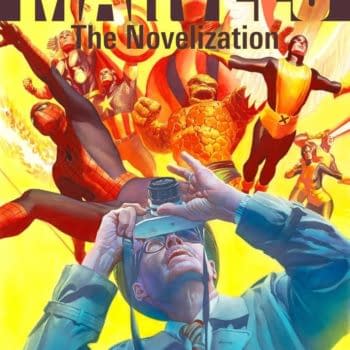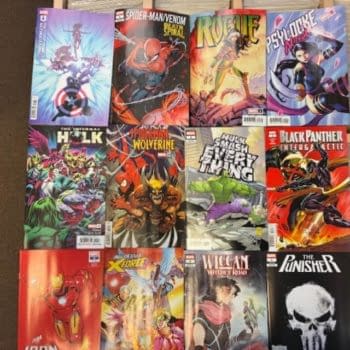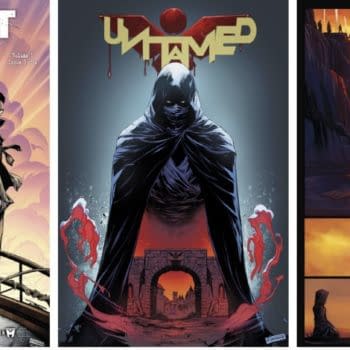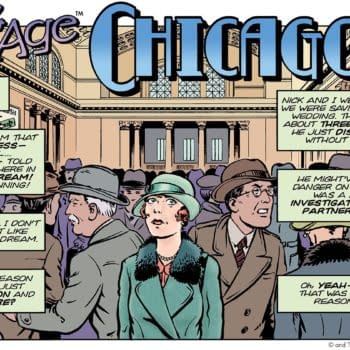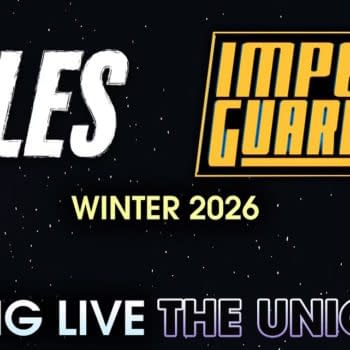Posted in: Comics, Recent Updates | Tagged: axe cop, Comics, dark horse comics, Derf Backderf, entertainment, ethan nicolle, image comics, Intersect, Malachai Nicholle, Punk Rock and Trailer Parks, ray fawkes, SLG Publishing
Thor's Comic Review Column – Axe Cop #1, Intersect #1, Punk Rock And Trailer Parks
This Week's Reviews:
Axe Cop #1
Intersect #1
Punk Rock and Trailer Parks TPB
Axe Cop #1 (Dark Horse Comics)
By Bart Bishop
I feel like I'm behind the curve on this whole Axe Cop thing, so luckily Dark Horse is releasing this new $1 Axe Cop #1. Reading through it, it certainly seems to sum up the general tone and intent of creators Malachai Nicolle and Ethan Nicolle, who started Axe Cop as a webcomic back in 2009. They proudly proclaim that Malachai is age 6 and Ethan is age 30, with Malachai coming up with the ideas and Ethan filtering them into relative coherence with his pencils, inks and letterings. The result is a fever dream of hilarity that reads exactly like a little boy insisting that you listen to every word of his rambling but incredibly important story. Somehow it all works, and holds together with the unexpected but surprisingly rule-bound logic of childhood, with good guys and bad guys and gadgets and might-makes-right and a kitchen-sink approach of anything and everything cool is welcome. With my own kid on the way, I feel like I'm in for several years of the strange dichotomy of Axe Cop that is one part innocence, one part mean streak that is fun but ultimately a little exhausting.
So, there's a story somewhere in here. Axe Cop and Dinosaur Soldier (I love these names, which describe everything you need to know about these characters) stumble through a series of what could almost be called vignettes but are more like left turns. First they're in a diner and notice a giant planet in the sky, so of course it's a threat. While en route to intercepting it they're stopped by "real cops" that apparently deeply resent Axe Cop for being so great. This leads to a series of confrontations with both the cops and the army, with Axe Cop and Dinosaur Soldier calling in help from Wexter (a full-grown T-Rex with flame breath and Gatling gun hands) and Uni-Man (a scientist with a unicorn's horn, 'cause why not?). Finally they destroy the bad planet, but Axe Cop has a dream that the dinosaurs, in the past, are in trouble so he and his team go back in time. Meanwhile he is oblivious to Psychic Boss and his helper who are plotting to steal Uni-Man's new creation, a machine that turns bad guys into good guys, and change it so it does the opposite.
How to judge a comic like this? It's obvious that Ethan started the whole endeavor as a kind of experiment to challenge himself, probably on a lark, but somehow it coalesces into something brilliantly powered by imagination. Often times these kind of oddball series ring false in how hard they're trying to be random, but Axe Cop does it so effortlessly. The dialogue in particular is so simple and yet economical. Axe Cop himself, for instance, is brusque but relatable in his straightforward attitude. Essentially anyone that gets in his way is "stupid" or "dumb", and he's not afraid to tell them so in the most obtuse way possible, often followed by malicious comeuppance. That's where Malachai shines through, as a child's sense of right and wrong is often backed by a clear need for retribution. Axe Cop is justified in his outrageous actions because his lot in life is a righteous one, and the result is over-the-top violence punctuated by blunt finality.
Ethan's art is particularly striking in how it blends the offbeat with the everyday in a stylized fashion. Axe Cop himself appears to be an everyday beat cop, but his axe subtly leans by his side. Dinosaur Soldier of course is dressed like Arnold Schwarzenegger circa 1989, all black tank tops and aviator shades. You take these stalwart protagonists and thrust them into insanity like space travel and secret laboratories and somehow it all works. Where Ethan really shines, however, is in his expressions. Axe Cop and Dinosaur Soldier are generally nonplussed, and not being able to see their eyes shifts the emphasis to their mouths, which are frozen in different degrees of grimace but somehow the slightest tweak goes a long way. By contrast everyone else is turned up to 11, with those surrounding Axe Cop often screaming with emblazoned eyes, action lines flying behind their heads like they're executing a Dragonball Z fireball attack. It all speeds along at a breakneck clip, never hesitating in its earnestness.
Now I see what all the fuss about, even if reading this was as exhausting as babysitting a first grader for a day.
Editor and teacher by day, comic book enthusiast by night, Bart has a background in journalism and is not afraid to use it. His first loves were movies and comic books, and although he grew up a Marvel Zombie he's been known to read another company or two. Married and with a kid on the way, he sure hopes this whole writing thing makes him independently wealthy someday. Bart can be reached at bishop@mcwoodpub.com.
Intersect #1 ($2.99, Image)
By D.S. Randlett (@dsrandlett)
So this is something.
Ray Fawkes, despite his work on DC titles like Constantine and Justice League Dark, has just landed on my radar as a creator to start exploring. Part of it has been curiosity as to how he's been getting so much work after seemingly coming out of nowhere, but mostly after learning about his stylistically diverse indie portfolio. I haven't quite figured Fawkes out yet, but I've been enjoying exploring his non-Big Two work. Not that his work for publishers like Marvel or DC is subpar, but stuff like The People Inside just feels deeper and more interesting.
Whereas a book like The People Inside is very rigidly structured, with panels feeling like ticks in a clock as it progresses and every double page spread sharing the same layout, the first issue of Intersect presents the reader with a very thought-out visual anarchy, reminiscent of the great Bill Sienkiewicz. In totality, Intersect is anarchic, which makes it hard to summarize from a plot standpoint, and the first reading actually left me feeling kind of cold. I think that this was because it felt like the very common first issue sin of not letting on what the series was going to really be about was being committed.
However, on the second reading, I started to get it. Intersect is structured like a horror story, and it take place in a world where the boundaries between pretty much everything are breaking down. There's a scene that gets this idea across really well that involves a man merging with a grill, and he starts speaking in terms of the grill's perspective. There are plenty of other examples of horrible things going on: it's snowing blood, and an unseen dog-thing (a former pet) chases the protagonists while an unseen voice heckles them. But I keep coming back to that grill scene.
Physically, the idea of human bodies just merging with other things to become new sorts of beings is horrible enough, but Fawkes is interested in how the self merges and changes as this happens. This being a serialized series, I can't really say where he is going with this thematically, but the way he represents these ideas in his art and page structure is really astounding. I compared his style here to Sienkiewicz earlier because that's the closest touchstone. But Sienkiewicz still uses a lot of inks and defined lines. Here, Fawkes adopts a watercolor style devoid of inks, which gives the feeling that everything represented on the page could merge into white space at any time. Appropriate for a story about what happens when the lines between things start breaking down.
I don't know that I've quite figured Intersect out, but it's a series that I will follow with great interest. It is obtuse and often frustrating, but well crafted and captivating. It's not for everyone, but I'm pretty sure that it's for me.
D.S. Randlett lives in the hills of Virginia and takes credit for the reviews that his emaciated twin brother writes while chained to the old radiator. He plays his guitar while biding his time for unsuspecting tourists and thinking about going to grad school.
Punk Rock and Trailer Parks TPB (SLG Publishing, $8.99/digital, $15.95/hard copy)
By Cat Taylor
Derf Backderf, the writer and artist of this trade paperback, could be just about anyone I've ever met in the punk rock underground. The story that he tells with this book is a familiar one. Sure, many of the specific details are different, but the basic story revealed here is a variation of just about every misfit's life in their own local punk rock scene, from indoctrination as a high school outcast, to full integration among a new peer group while discovering music unlike anything they'd ever heard before, to the final bow out of their local scene to pursue new avenues of life. To paraphrase what Backderf himself says about this story, "it isn't true, but it could be." It "could be" to the point where I'd bet good money that some of the more seemingly bizarre situations in the story came from real life experiences. They certainly aren't too far removed from what my friends and I experienced in our own local underground.
Whenever someone gives a fictional account based on real life, there can be a great temptation to sanitize things or make situations seem better than they were. When that happens in this story, it seems pretty obvious that those are most likely the completely fictional parts. For instance, in order to pay tribute to many of the great and now deceased punk rock legends, Backderf includes such luminaries as the Ramones and Joe Strummer among the people who hang out with Otto, the "hero" of the story. While there was a lot of opportunity to meet touring punk rock bands in 1980, my feeling is that the inclusion of such icons was more of a tribute to the music Backderf loves rather than a retelling of actual experiences. However, many of the less admirable story elements seem closer to real experiences. For example, Otto himself is no "movie star outcast." You know what I'm talking about. In movies, Hollywood producers cast good-looking actors as social outcasts, but there is absolutely no reason why these kids wouldn't be loved and accepted by their peers. They're always well-adjusted nice guys who just get picked on by the jocks. Backderf rejects that premise and makes Otto a completely annoying yet arrogant spaz. He's the kind of nerd that even some of the other nerds had a problem with growing up, constantly spewing Tolkein quotes and outright lying about his life conquests. Becoming a punk rock legend doesn't really change him or make him more likeable, and that's part of why his story seems more real than most books and movies that are supposedly "based on a true story."
As an artist, Backderf has a style similar to, but far more accomplished than many lesser known underground cartoonists. I wouldn't rank his work among the Bagges, Crumbs, Clowes, or Hernandezes of the world, yet his work does appear to take influences from all of them, most notably R. Crumb and Daniel Clowes. In any case, his work is definitely more fun to look at and communicates linear story-telling better than the hundreds of college campus newspaper cartoonists and self-publishers trying to get recognized.
For someone like me, who grew up on comic books, lived in a small town and discovered punk rock in the larger metropolitan area thirty miles from home, Punk Rock and Trailer Parks is a blast. Fictional or not, it's like having the most interesting stories from my life and others I knew collected into a comic book. If you never had the "punk rock revelation" while growing up, you may find this book uninteresting and a complete waste of time. Otherwise, I don't see how anyone who lived through similar circumstances couldn't find something to love. If you do like this collection, you may also want to check out some of Backderf's other work such as My Friend Dahmer or The City.
Cat Taylor has been reading comics since the 1970s. Some of his favorite writers are Alan Moore, Neil Gaiman, Peter Bagge, and Kurt Busiek. Prior to writing about comics, Taylor performed in punk rock bands and on the outlaw professional wrestling circuit. During that time he also wrote for music and pro wrestling fanzines. In addition to writing about comics, Taylor tries to be funny by writing fast food fish sandwich reviews for Brophisticate.com. It sure does get dark early this time of year. It's cold out too. You can e-mail him at cizattaylor@hotmail.com.













